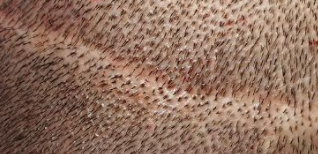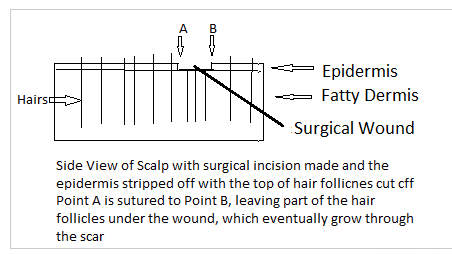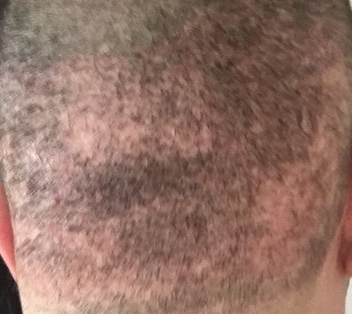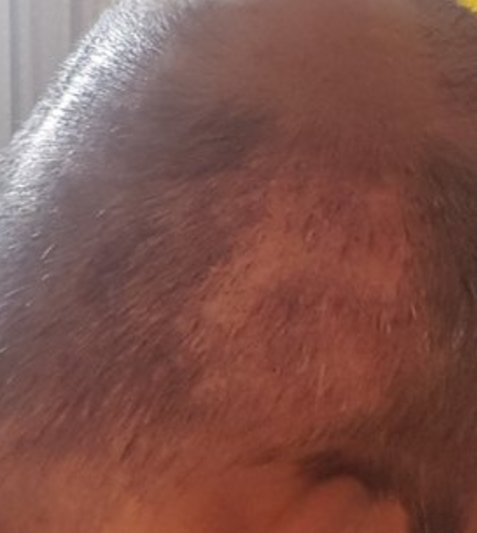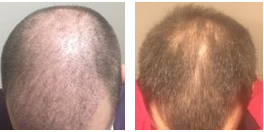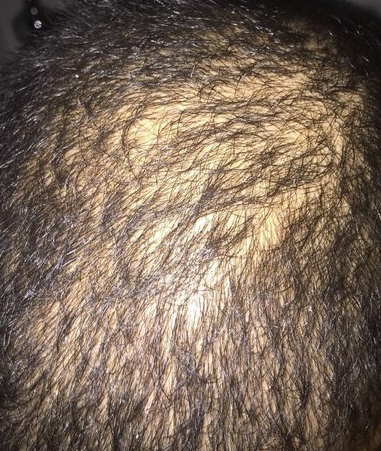A trichophytic closure is performed n a wound typically in hair transplant surgery when a strip surgery is performed. The idea is to cut off the epidermis as shown in the schematic diagram below and then to bring the two edges of the surgical wound together with a suture or a staple. Point (A) is sutured to point (B) leaving the cut-off hair follicles below what will eventually become the wound and the scar as shown in the photo on the left. This is a patient where I performed a trichophytic closure at his strip many years ago. Please note that the scar did widen to a distance of 4mm (I measured it today as he came in for an FUE to thicken his hair and address is balding crown). This trichophytic closure technique removed a 4mm distance of epidermis so in this particular patient the entire 4mm section where the epidermis was removed was where the scar formed. Hair grew through the scar as seen here. Few surgeons who perform trichophytic closures remove 4mm of epidermis for reasons I don’t understand (they may remover 1mm from each edge of the wound which would not have cover this man’s scar). What is interesting is that despite the hair that grew into the scar to emerge through the entire scar, the white scar tissue nevertheless appeared which is almost always the case. For this reason we do not fix existing scars with trichophytic incisions but rather with scalp micropigmentation which addresses the issues of scar color very nicely (see here: https://scalpmicropigmentation.com/scar-covering/).
Your donor area was over-harvested. To make matters worse, the grafts taken were outside the permanent zone and the area of depletion goes both too high and too low. The only treatment that really works for this is Scalp MicroPigmentation. Some people suggest that areas like this get covered with body hair, but body hair could be used (possibly 3000 or more body hair grafts).
See here for the best and most certain solution: https://scalpmicropigmentation.com/scar-covering/
My biggest fear before I start Fin is that I wont be able to have a child afterwards, I don’t plan on being on it any longer than 4 years. My doctor told me about the risk in decreased sperm count but I didn’t ask her what percentage of men actually get it and what percentage of men get it after discontinuation. Also will my age be a factor, I’m 19 years old with not a lot of money so Fin is my only option so far.
I don’t know that there are any statistics on decreased sperm count on Finasteride, but it happens more frequently than most people realize. It appears to correct within 6 months of discontinuing the drug as the sperm cycle for production of new sperm takes 6 months on average. There is a study, however, that shows that low sperm counts is becoming a prevailing problem in the western world.
See here: https://www.npr.org/2017/07/31/539517210/sperm-counts-plummet-in-western-men-study-finds.
Also the cause of this problem seems to point to the wide-spread use of pesticides.
See here: https://news.nationalgeographic.com/news/2005/04/0427_050427_strangedays3.html
What I love about this blog is that I often have to research many of the questions asked of me and learn a great deal in the process of doing this research as in this particular post.
A couple of years ago, I had sudden hair loss which triggered bad anxiety and depression. So much so that I couldn’t function. Last summer I had a dream job between semesters at school, but when I was there I couldn’t think straight my anxiety and stress was so bad that it seemed to make the hair loss worse. I subsequently had to quit school for a year and put all my money into getting a hair transplant. Now, one year later, I do have a better head of hair but I hate how much I have allowed hair loss to affect me and I regret that I let it affect me so much. Is this normal?
A World Champion weight lifter told me that he was able to control everything in his life, his body, his health, his education, his friends but the one stumbling block for him was his hair loss as he had no control over it. Many years ago, he had a hair transplant by a doctor who he said “mutilated him”. Yes, he had terrible hair transplants and my job was to fix it. After two surgeries, he looked good and we became close friends still to this day. He has met my entire family and even taught self-defense to some of my kids when they were in their late teens.
Hair transplants, in your case, did help you with a problem that was out of your control and it is a credit to you that you took charge of your life. It takes courage to get a surgery to deal with hair loss because sometimes there is no other option.
You seem to have developed donor site depletion. This could be from over-harvesting during your FUE (taking too many grafts too close to each other). This can be shock loss of the donor area from over-harvesting. If it is, it might recover. You will not know for at least six months from the date of the surgery. If it does not go away, then Scalp MicroPigmentation is the best solution. See here: https://scalpmicropigmentation.com/scar-covering/
I hear about the self-confidence issue all of the time. You would not believe how many wealthy, very successful people I have performed hair transplants on and the reason driving them is almost always the issue of “self confidence”. A few well known people in the world of tech, some CEOs of fortune 500 companies and some very famous actors, had hair transplants by me in the very early part of their career. We have become friends and the actors, as a good example, absolutely believe that the hair transplants transformed them in terms of their “self-confidence” giving them the freedom to be themselves and to do what they do best without worrying about hair loss. Issues of self-confidence is not something men talk about to just anybody, but to the man in the mirror, they tell it the way it is. Even Donald Trump has a hair problem and I am sure that is part of his insecurity. The post below from Reddit shows the importance of family and friends in opening up and talking about hair loss problems.
Shock loss in young men under 30, rarely reverses so that is why I ask my young patients to take Finasteride to prevent it. Shock loss is an acceleration of the hair loss process that normally occurs and it impacts hair that is usually within a few years of falling out. In men, it is unlikely that it will come back but in women it usually returns.
No, Finasteride will not help the grafts grow. Finasteride works to accomplish two objectives:
(1) slows or stops the balding process or
(2) prevents shock loss in men under 50 who have a hair transplant.
The likeliness of shock loss for men decreases with age. It is worse for men in their 20s and less so in their 30s and so on.
A non-balding male or female has normal hair loss of about 100 to 150 hairs per day and regrows the same number. These new hairs break through the skin and grow at a rate of about a half inch per month. The hairs you lose will come out during the day, at night when you sleep, on your pillows, in the shower, when you comb or brush your hair, almost anywhere you go no matter what you do and most of the time you will not see them falling out.
The degree of thinning that you are experiencing would suggest that you should see a doctor who most likely conduct Bulk Measurements of your hair to determine the degree of the thinning that you are presently having. If the diagnosis is early genetic hair loss, the most common cause of hair loss in young men and you are probably following your father’s balding problem, then the best treatment would be the drug Finasteride, which is highly effective in men of your age, may not only stop the hair loss but possibly reverse it. If you are developing a more advanced balding pattern, the best test to get is the HAIRCHECK instrument test which will determine the Bulk Measurements of your hair. This will show, over a one-year time frame, how effective the drug therapy will be. Once you know this information, then you and your doctor need to develop a MASTER PLAN which will define what you need.
Thinning neck hair occurs as a genetic trait. When some men get older, they lose their neck hair. This can’t be stopped with Finasteride.
I’m 29 and I was on Propecia & Minoxodil for almost eight years and I could save my hair till now but recently I am experiencing severe side effect from Propecia so I decided to stop it. I stopped Propecia two month ago and my hair is falling like rain! And I lost half of my hair in two month, what do I do?
We call this “catch-up hair loss” and it is one of the terrible things about stopping Finasteride when it is working well enough to hold on to most of your hair. Unfortunately, the sexual side effects are a complication that most men will not tolerate and eventually a hair transplant becomes the only option.
This is a post on reddit, a hair loss forum for young people, mostly men. This particular post discusses this man’s journey with drugs for his balding problem with photos and a full chronology. Worth reading.
If you’re sitting there wondering, "I’m losing my hair, what do I do?" then read my advice here. I’ve been fighting the fight for 7 years, with great success. (pictures included) from tressless
Ask a family member or a friend for an opinion before you jump in and do something that you might regret. There are many things that can be done for this. If you are a male over 25, a hair transplant works great. However, I always tell young men like you that “A GOOD DECISION TODAY IS A GOOD DECISION TOMORROW” so if you are under 25, be patient and wait until you know how much balding you will develop.
The "I look fine in the mirror/horrible in photos" effect — what is it?! from tressless
I had my FUE surgery two months ago and I am still numb throughout the front of my scalp. How long will it take to get better?
Persistent numbness does happen. You must realize that small nerves were damaged when the FUE surgery was performed and these nerves are recovering. The numbness will eventually go away, just be patient.
Page 2 of 6

